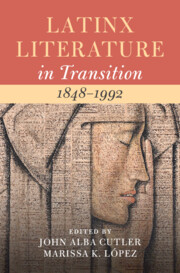Book contents
- Latinx Literature in Transition, 1848–1992
- Latinx literature in transition
- Latinx Literature in Transition, 1848–1992
- Copyright page
- Dedication
- Contents
- Figures
- Contributors
- Acknowledgments
- Introduction
- Part I Space
- Part II Being
- Part III Time
- Part IV Form
- Chapter 13 Entre Balas y Rugidos
- Chapter 14 Modernism’s Workshops
- Chapter 15 Lyrical Mobilities
- Chapter 16 Bullets, Guns, and Tattoos
- Part V Labor
- Bibliography
- Index
- References
Chapter 15 - Lyrical Mobilities
William Carlos Williams and Julia de Burgos in the Latinx Grain
from Part IV - Form
Published online by Cambridge University Press: 10 April 2025
- Latinx Literature in Transition, 1848–1992
- Latinx literature in transition
- Latinx Literature in Transition, 1848–1992
- Copyright page
- Dedication
- Contents
- Figures
- Contributors
- Acknowledgments
- Introduction
- Part I Space
- Part II Being
- Part III Time
- Part IV Form
- Chapter 13 Entre Balas y Rugidos
- Chapter 14 Modernism’s Workshops
- Chapter 15 Lyrical Mobilities
- Chapter 16 Bullets, Guns, and Tattoos
- Part V Labor
- Bibliography
- Index
- References
Summary
This chapter imagines potential and as yet unexplored rapprochements between William Carlos Williams (1883–1963) and Julia de Burgos (1914–53), two contemporaneous writers on the brink of Latinx identification, as it is currently conceived. Observing their generically and linguistically diverse writing practices – marked by distinct introspections about Puerto Rican, Caribbean, pan-Hispanic, Anglo-American, and European identities – I open a discussion of the authors’ experiences of everyday spaces (the city street, the hospital ward, the intergenerational home). What I call “lyrical mobilities” constitutes the process of imagining Williams’s and de Burgos’s movements through hemispheric histories as well as geographic and linguistic spaces. It is also a critical attempt to read these two canonical authors in terms of the spaces they had in common, which, in turn, helps extend our understanding of Latinx lives across disciplines that have contained Williams and de Burgos within discrete silos.
- Type
- Chapter
- Information
- Latinx Literature in Transition, 1848–1992 , pp. 260 - 276Publisher: Cambridge University PressPrint publication year: 2025

